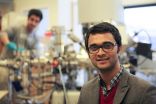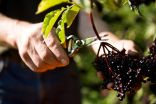Yeast cells optimize their genomes in response to the environment
Genome changes sustain faster replication
2015-07-21
(Press-News.org) Researchers at the Babraham Institute and Cambridge Systems Biology Centre, University of Cambridge have shown that yeast can modify their genomes to take advantage of an excess of calories in the environment and attain optimal growth.
The ability to sense environmental nutrient availability and act accordingly is a critical process for all organisms. Changing behaviour in response to nutrients can occur at many levels: the activity of proteins can be varied or new genes can be activated to produce a different set of proteins. Research published in the latest issue of PNAS reveals that yeast go one step further and actually modify their genomes to act optimally in the current environment.
We think of the information in our genome as stable, only changing occasionally through random mutation. However, a handful of genes in organisms from yeast to mammals are known to change rapidly at specific times and in specific cell types. A good example of this is the system which creates immune diversity in vertebrates. How these systems are controlled is a major question as mechanisms that cause genome change can be very dangerous if mis-directed. This is especially true for single-celled organisms like yeast, for which a genome change affects not just an individual but is passed down to all its descendants.
This research looked at the genes encoding ribosomes - the factories that produce proteins in cells. To create an entire new cell requires the synthesis of a huge amount of proteins by the ribosomes, and a vast proportion of cellular resources are used in producing enough ribosomes to allow cells to divide at the maximum possible speed. TOR is a signalling pathway that coordinates growth rate in response to nutrient availability and controls the rate of ribosome synthesis. TOR signalling is conserved from yeast to mammals and controls numerous processes, one notable example being the response to caloric restriction which slows growth and can extend lifespan.
In the paper published in PNAS, the researchers show that TOR also responds to caloric excess, instigating a pathway that increases the number of ribosomal DNA genes in the genome. Yeast engineered to carry a sub-optimal complement of ribosomal DNA genes are known to undergo gene amplification to correct this deficit, but it was not known why. The researchers found that these cells perceive the normal environment as containing an excess of calories because they struggle to produce enough ribosomes to maintain normal levels of protein synthesis. TOR signalling responds to this caloric excess and initiates ribosomal DNA gene amplification. Amplification of the ribosomal DNA genes provides a long term, heritable increase in ribosome synthesis capacity to enable optimum reproduction rate and make best use of available nutrients. It will be fascinating to now ask whether TOR can also drive genome changes in higher organisms in response to an excess of calories, and what effects this might have on health and lifespan.
INFORMATION:
ELSE PRESS RELEASES FROM THIS DATE:
2015-07-21
A majority of men who have sex with men (MSM) and transgender women (TGW) at high risk for HIV infection took anti-HIV medication for pre-exposure prophylaxis (PrEP), most of the time, in a multi-site U.S. study examining use of this HIV prevention strategy outside of a clinical trial. The study, called the PrEP Demo Project, was funded by the National Institute of Allergy and Infectious Diseases (NIAID), part of the National Institutes of Health.
The study findings will be presented by Albert Liu, M.D., of the San Francisco Department of Public Health, at the 8th International ...
2015-07-21
Children born with ADNP-related autism syndrome suffer from a heart-breaking combination of ambiguous developmental problems injurious to both their physical health and cognitive functioning. For parents, the mystery surrounding their infants' suffering can be even more agonizing than the syndrome itself, which has no known cure.
Recent research from Tel Aviv University and the University of Antwerp is easing some of that agony. Activity-dependent neuroprotective protein (ADNP), discovered by TAU's Prof. Illana Gozes 15 years ago, has now been shown by Prof. Frank Kooy ...
2015-07-21
One of the enduring mysteries of the human experience is how and why humans moved from hunting and gathering to farming.
From their beginnings humans, like other mammals, depended on wild resources for sustenance. Then between 8,000 and 12,000 years ago, in a transitional event known as the Neolithic Revolution, they began to create and tend domestic ecosystems in various locations around the world, and agriculture was born.
Despite decades of research into this major human advancement, scientists still don't know what propelled it.
The recent work of a research ...
2015-07-21
WASHINGTON, DC - July 21, 2015 - Each year, scientists create an influenza (flu) vaccine that protects against a few specific influenza strains that researchers predict are going to be the most common during that year. Now, a new study shows that scientists may be able to create a 'universal' vaccine that can provide broad protection against numerous influenza strains, including those that could cause future pandemics. The study appears in mBio, the online open-access journal of the American Society for Microbiology.
"The reason researchers change the vaccine every year ...
2015-07-21
WASHINGTON -- Advertisers hoping to sway consumers might want to rethink running spots within media with violent or sexual themes, and might do better if the ads themselves have a G-rating, according to a study published by the American Psychological Association. Instead, violent and sexual media content may impair advertising's effectiveness and ultimately deter purchasing, the research found.
"We found almost no evidence that violent and sexual programs and ads increased advertising effectiveness," said Brad J. Bushman, PhD, professor of communication and psychology ...
2015-07-21
Believe it or not: X-ray works a lot better on rocks than on paper. This has been a problem for conservators trying to save historical books and letters from the ravages of time and fungi. They frankly did not know what they were up against once the telltale signs of vandals such as Dothidales or Pleosporales started to spot the surface of their priceless documents
Now Diwaker Jha, an imaging specialist from Department of Chemistry, University of Copenhagen, has managed to adapt methods developed to investigate interiors of rocks to work on paper too, thus getting a ...
2015-07-21
HOUSTON -- (July 21, 2015) - Phosphates artificially added to dairy and cereal products appear to cause bigger spikes in blood phosphorus levels than naturally occurring phosphates, potentially putting harmful stress on kidneys. Too much dietary phosphate stiffens blood vessels, enlarges the heart and is bad for bones, but a new study by Houston Methodist researchers suggests it matters where the phosphates come from.
The scientists' report will appear in the August 2015 issue of the American Journal of Clinical Nutrition (early online).
"The study suggests people should ...
2015-07-21
The negative health effects of international air travel are well documented but now it seems that the common elderberry can provide some relief.
Associate Professor Evelin Tiralongo and Dr Shirley Wee from Griffith's Menzies Health Institute Queensland (MHIQ) have completed a clinical trial showing that an elderberry supplement can provide some protection from cold and flu-like symptoms following long-haul flights.
Intercontinental air travel can be stressful and affect a passenger's physical and psychological wellbeing. Whilst jet lag and fatigue remain the best known ...
2015-07-21
A special type of synthetic sugar could be the latest weapon in the fight against superbugs.
A team of scientists from The University of Queensland and Queensland biotechnology company Alchemia have discovered a potential new class of antibiotics inspired by sugar molecules produced by bacteria.
New antibiotics to which bacteria are unlikely to develop resistance are urgently needed to combat the rise of superbugs - drug resistant bacteria.
The research, led by Professor Matt Cooper and Dr Johannes Zuegg from UQ's Institute for Molecular Bioscience (IMB) in partnership ...
2015-07-21
Swedish researchers at Uppsala University and the Karolinska Institute have found that genes that control the biological clocks in cells throughout the body are altered after losing a single night of sleep, in a study that is to be published in the Journal of Clinical Endocrinology and Metabolism.
"Previous research has shown that our metabolism is negatively affected by sleep loss, and sleep loss has been linked to an increased risk of obesity and type 2 diabetes. Since ablation of clock genes in animals can cause these disease states, our current results indicate that ...
LAST 30 PRESS RELEASES:
[Press-News.org] Yeast cells optimize their genomes in response to the environment
Genome changes sustain faster replication

